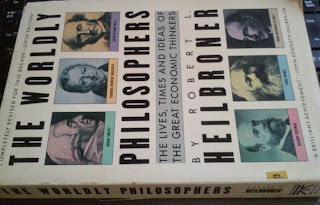The first book I read that contains so long list of reference is Basic Economics of Thomas Sowell. When I read this book, I was surprised that it ended at 70% of its Kindle version. Another 30% is the long list of reference.
Clearly, the author is a well-read political scientist. He combines very relevant sources of knowledge to his topic. After reading this book, as not a student of political science, I feel my knowledge is doubled, perhaps due my scant knowledge in the subject. When I read Henry Kissinger's On China, the word Order was used widely. I could not even decipher its meaning!!! However, Francis put in plainly, and the use of its opposite political decay helps me to understand deeper.
This book targets those who are interested in developing a country. To build a country, one good leader is far from sufficient. A learned reader would not deny that one needs a good system or institution to run a company, an NGO, an institution or any organization that involves human society. Specifically, how to develop a sustainable institution or institutions i.e. political order and what kinds of elements may those institutions collapse i.e. political decay? There are three core elements for a political order: State, the Rule of Law and Accountability. The consistent balance between the three pillars make a sustainable political order.
State
There are many possible reasons as to why and how a State was formed. For instance, the need for a strong army, with an efficient ability to collect tax, to defend one's own country from foreign invasion is one of the main reasons, and it happened to countries such as Prussia, early Qing Dynasty etc. The State holds monopoly power and is able to enforce laws or customs in their controlled territories on all residents.
Rule of Law
All early dynasties, at their most clean form, ruled by law. All people are under the law except the monarch. This is efficient in controlling the subordinate but fail to create a political order because people, in their genes, think people are equal, at least at the back of their head.
The rule of law is also indispensable for economic development. Without clearly defined and enforced property rights, no one has incentives to make the best use of their property as well as to develop it further, as a result the economy stagnates.
The State itself has to be under the law as well. No one is above the law. In addition, the law has to be impersonal,i.e. not created in favor of this or that group even to the poor.
Is the decision making has to be rule-based or discretionary? This is an old question. The author posits that Denmark has the most efficient in terms of the rule of law and discretionary decision makings. The U.S government has many principals (to use economic concept of principal-agent problem) and contradictory rules.
Accountability
I believe the author is a free marketeer. However, he is not a libertarian thinker. I believe he is one of the few political scientists who understands economics very well and reject some of its theories very well as well. For instance, the concept of fairness. Redistribution of wealth, he acknowledges, creates disincentives and distorts economic activities. However, people have different view regarding fairness. When people see a bunch of their neighbors are extremely rich beyond their imagination, they may feel it unfair and ask for or vote for redistribution. If the demand for redistribution is high, like in Europe, the political order is less stable when people choose politicians who redistribute instead of smart and responsible ones. People need a government because they have reasons to expect from government and/or politicians, where sometimes they cannot differentiate. Thus, clientelism and patronage, if not tamed, will play irritating parts in politics.
I hope this summary induces you to read the book, not to stop here!!!
Title: Political Order and Political Decay: From the Industrial Revolution to the Globalization of Democracy
Hardcover: 672 pages
Publisher: Farrar, Straus and Giroux (September 30, 2014)
Language: English
Publisher: Farrar, Straus and Giroux (September 30, 2014)
Language: English
My rating: 5/5
See also his The End of History and the Last Man
 |
| Political Order and Political Decay |



